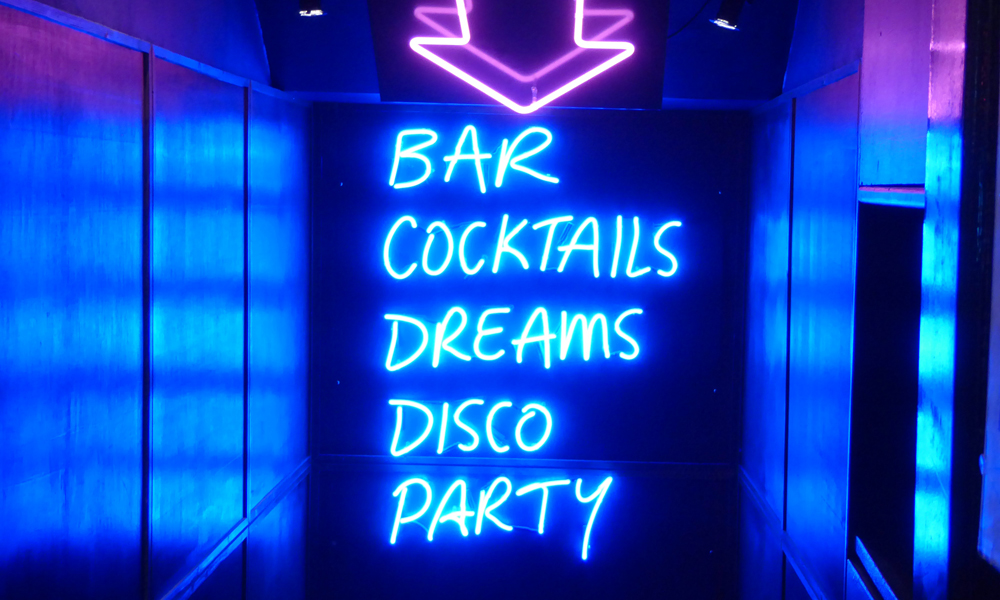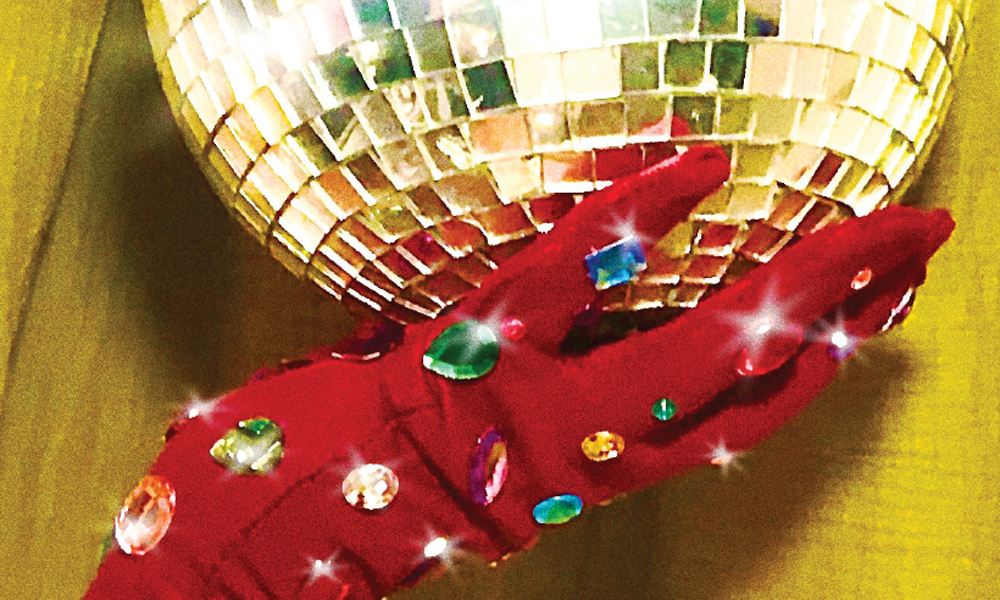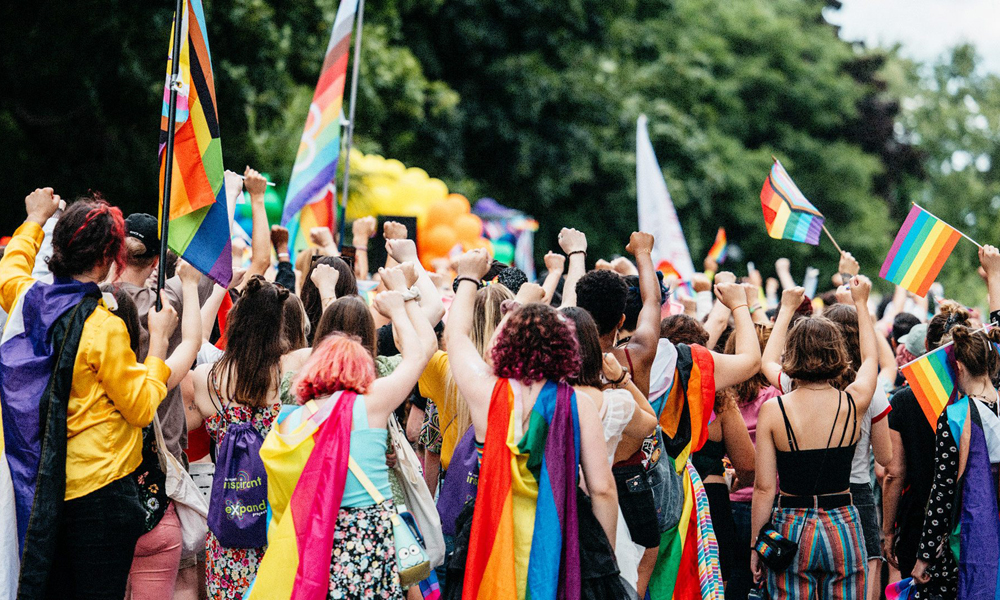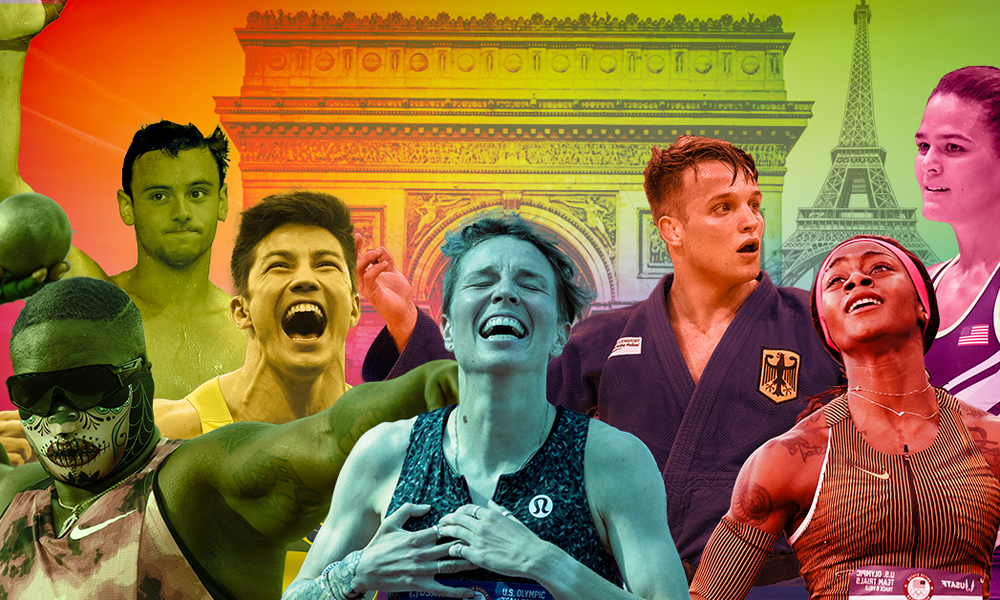In a Boys Club for sissies, can we not make room for our cis sisters?…
By Jesse Boland
There is a myriad of threats posed against gay men in our current climate: bible-thumping GOP lawmakers, violent right-wing extremists, super-gonorrhea, driving tests, algebra. Drunken bachelorette parties, however, are not one of them. Yet for some reason, a constant point of aggravated concern for so many gay men is that straight women occupying gay bars and clubs is some sort of heterosexual invasion that is robbing gay men of our safe havens. While this manufactured panic could once easily be dismissed as an eyeroll-inducing statement expressed by a disenfranchised homo annoyed at inflated bar populations who are forcing him to wait in line longer for his vodka soda, the objections of many of the men expressing this rhetoric reflect a far more vile undertone – a glittery misogyny looming under the surface of our community. The insistence that women have no place in our community not only screams that quiet part out loud, but also questions the true purpose of these spaces: who exactly are we “protecting” them from?
Now, we can be honest and say that, yes, we have all had experiences of watching absolutely obliterated straight girls acting like recalcitrant demons fuelled purely by White Claws and with an insatiable desire to show pictures of their dog to strangers, but can we truthfully say we have not all had our nights like that? Of course we have, because, ultimately, while gay bars/clubs do serve as convivial spaces for individuals to feel safe and connected with other members sharing their marginalized identities, the intended function of these establishments is for people to drop concerning amounts of money on regrettable debaucheries in the name of having a gay ’ole time.
Yet, we as gay men like to clutch our ASOS pearls at the sight of bachelorette parties or out-of-town girls’ trips behaving in such a fashion…as if we had not just been propositioned for head and/or a bump in the bathroom by a friend of a friend just moments ago. Anyone who has been regularly participating in gay nightlife can undoubtedly tell you that, realistically, you are more likely to be shoved while standing in line for the bar by an entitled twink than a bratty college girl, or non-consensually groped by an overly assertive leather bear than a 50-something-year-old straight woman trying to enjoy a night out now that her kids have left for college. In truth, if one were to seek a venue to partake in demure hobnobbing over discussions of contemporary theatre paired with piquant libations amongst our community’s most socially elite, Crews & Tangos would perhaps not be the first recommendation on Google.
So then, for what purpose do we as gay men feel obliged to chastise these women for participating in the same dipsomaniac behaviours as ourselves, if not to ostracize them in the way heteronormative bars have done to us?
A common argument used by many who assert this claim is that queer spaces are scarce and need to be preserved at all costs through the method of gatekeeping – an argument that in most cases is actually quite fair and agreeable, yet seems to struggle with articulating just who falls under their definition of “queer” in order to gain access to these spaces. Many feminists over the years have similarly insisted on creating women-only clubs, gyms, tattoo studios, etc., in the name of creating safe spaces for women free from predatory male influence, but they struggle to delineate who indeed is considered a woman both legally and socially, largely ignoring the existence of trans women and androgynous non-binary individuals. By this rhetoric, the authenticity of a person’s gender and identity is determined not by themselves but rather by what standards of conventional femininity they either check or fail to check.
This issue presents itself in an even larger and more complex scale for gay bars that demand their patrons prove their gender and sexuality in order to access the vicinity. If we are to insist that only queer women may enter our establishments, are we then to demand upon entrance that women present themselves in a certain fashion that we deem “queer enough” for our comfort? When we say only queer women may enter our bars, are we keeping in mind the existence of lipstick lesbians, bisexual women in heterosexual relationships, non-binary femmes, cis-passing trans women, and women who are in the process of questioning if they even are women?
In an article for GQ back in 2021 (aptly titled The Agony and the Ecstasy of Getting Mistaken for Cis), model/actress Hari Nef recounted an experience of hers in which she was denied entry to a warehouse party in Berlin because the event’s door girl dismissed her transness, denying her and her cishet male chaperone entry under the assumption that the two were but another annoying straight couple trying to crash a modern saturnalia of queer joy. In the piece, Nef noted her conflicting senses of gender euphoria of fully passing on the outside as the woman she has always known herself to be, while simultaneously feeling dejected not only that her passingness had alienated her from a scene she has spent the better part of her life participating in, but also that the ultimate determinant of her womanhood was her romantic proximity to a cishet man. In the eyes of the world, all of her physical feminine beauty and her couture womenswear regalia and her distinctive transexual ingénue charm had not been as much of an indicator of her expression of gender identity as being a piece of arm candy for a man.
By creating a list of rules to abide by in order to gain access to our spaces, we are reinforcing the very same heteronormative standards of gender theory that forced us to create these spaces to begin with; we are ultimately just another No Girls Allowed boys’ club, all while playing the Britney Spears remix of Rihanna’s “S&M” in the background.
As I try to better understand why so many gay men feel a reluctance to share these revered spaces with women, I try to think of what exactly draws these women to our bars over straight bars that would ideally better suit their interests (such as potential hookups and shorter bathroom lines). For women whose idea of a fun night out isn’t sitting in a club booth pretending to laugh at the jokes of unfamiliar drunk men so they don’t get murdered, gay bars serve as a sanctuary where these women can get dressed up, take shots, mingle with strangers, and shake their ass without fear of an off-the-clock disgruntled employee squeezing it: this is also colloquially known as having fun. For this reason, it is flabbergasting to imagine why certain gay men would not want to party amongst these jovially tipsy pixies, other than that their lack of sexual interest renders them worthless to those men.
As gay men, we often ignore the misogyny within our communities, but the key patriarchal belief that a woman’s worth is dependent on what she may provide us sexually reveals itself time and time again in our treatment of women whose presence in our spaces hinders our chances of getting laid. While bars are places for people to dance, drink, mingle and get laid, in the straight world they are also high-risk areas for women, who face the risk of assault from predatory men who take advantage of women’s moments of inebriated vulnerability as an opportunity to prey upon them. So it is more than understandable why women may seek refuge in our lower-risk spaces.
I won’t deny that it can be pretty annoying to have to wait in line for the bathroom behind a person who takes quadruple the time to pee, but if my sharing this space with her reduces her likelihood of getting drugged and raped at a straight club, then that is a tribulation I am willing to bear.
We as gay men have succeeded in creating a culture in our nightlife all our own that has made the world a better place in countless ways, and we have done it in spite of generations of bigoted vitriol from both homophobic men and women. But we cannot dismiss the work that cishet women have contributed to our getting here. Whether it be Bette Midler performing in New York bathhouses in the 1970s, or even Adele and Jennifer Lawrence playing Musical Shots at Pieces in the middle of the day, straight women have played an integral role in making our culture what it is.
It might be the supportive best friend taking her newly out bestie to a bar for the first time because he doesn’t have any gay friends to take him; or the supportive PFLAG mom trying to understand her gay son better by exploring his interests; or the overly enthusiastic drag fan who tips queens $10 every song; or that bad bitch who helps her dollfriends get ready before going out, and will throw hands if anyone tries to say anything to them; or even the annoying girls who contribute absolutely nothing to the community but still have every right to be there because they’re paying customers and don’t owe you shit. Straight women are a part of our communities, even if they’re just neighbours who want to borrow a bump of sugar.
JESSE BOLAND is that gay kid in class who your English teacher always believed in. He’s a graduate of English at Ryerson University (now Toronto Metropolitan University) who has a passion for giving a voice to people who don’t have data on their phones and who chases his dreams by foot because he never got his driver’s licence.







RKG / 07 January 2024
I’m sorry, I don’t agree. It’s not a space for them. Period. If a cool straight girl comes in and behaves and realizes that she’s a guest in that space, cool, come on in. However, Woo-hoo girls tend to come in and cock block and make the space all about them. Not all of them are allies, they don’t tend to know the history of why gay bars are a thing. They can literally have their bachelorette party ANYWHERE else in the world. LGBT people can’t be themselves anywhere else. Gay men are allowed to feel some kind of way about that. Most of them come in are extremely obnoxious.
As for the entitled twink reference, they can be handled as it’s still a space for them. Bachelorette parties come in solely with the attitude of entitlement. Demanding you buy them a drink. Lesbians can’t stand them either it’s not just a Gay guy thing. LGBT people still don’t have rights in almost 70 countries in the world, and a portion of them still have the death penalty for being gay, while those chicks can go into those countries and happily have their bachelorette parties.